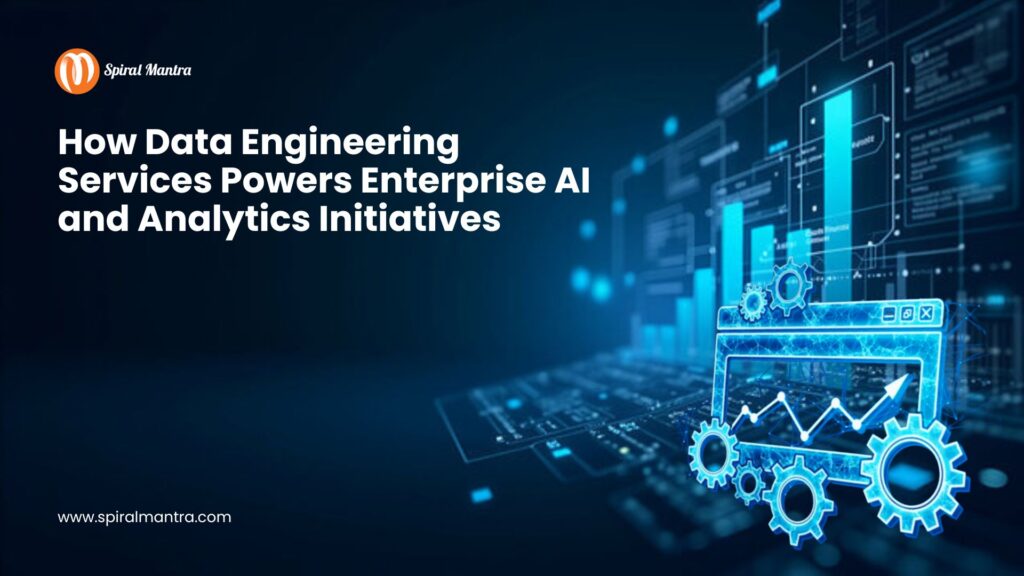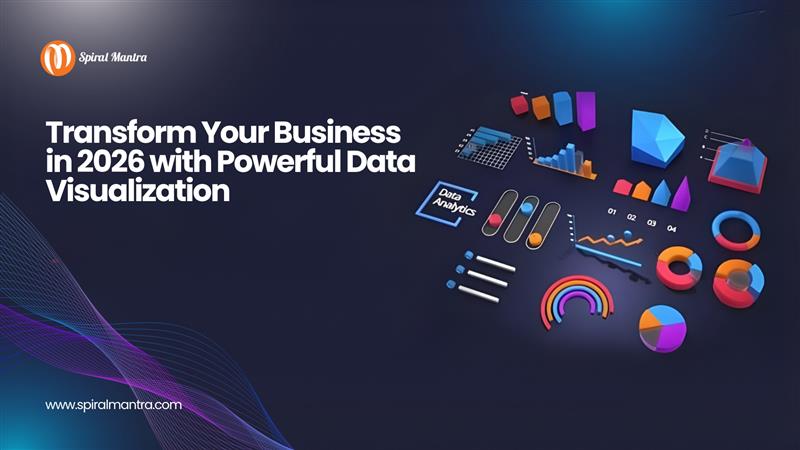
Introduction
Modern businesses are generating more data than ever! And with growing data generation, businesses are now focusing more on implementing AI solutions. But the real challenge comes from scattered, inconsistent data.
That’s where data engineering services come in. They create adaptable pipelines that collect data from many sources and organize it into consistent formats based on the business needs.
In this blog, we will be discussing why data engineering services are important and how Spiral Mantra helps businesses overcome data siloes.
What is Data Engineering?
In simple words, it is the process of designing, building, and maintaining systems that collect, store, and process large amounts of raw data to make it usable for analysis, data science, and machine learning.
Data engineers then create and manage data pipelines making sure data is clean, and reliable- for others to derive insights to make informed decisions.
Understanding Key Components of Data Engineering Services
- Data Ingestion and Integration: This refers to collection of data from multiple sources through real-time streaming or batch processing which ensures continuous and timely availability.
- Data warehousing: It is important to centralize data in scalable repositories. Structured and unstructured data make analytics more flexible.
- Data transformation: ETL process is to extract, transform and load. This involves collecting data and cleaning it to convert the raw data into meaningful insights.
- Data quality: This includes verifying data accuracy, tracing its source, and maintaining regulations that provide a credible level of compliance and reliability.
As businesses continue to grow; scalable infrastructure becomes important to support their growth and performance. This means organizations will need solutions that can scale without bottlenecks.
And, at Spiral Mantra, a leading Data Analytics solutions company, we can help you evaluate large data sets, allowing you to take better business decisions.
Changing Landscape of Data Engineering
Data engineering services have evolved alongside technological advances as well as rising business needs. While earlier solutions focused on simple integrations and batch processing; modern platforms need real time data movement, and AI powered automation.
This drastic change has been driven by the need for speed, and intelligence because- enterprises now expect immediate access to insights. As a result, data engineering is no longer just an IT requirement but an enabler that connects business goals with strong outcomes.
However, every new scalable solution comes with its own set of pros and cons. Some of the common challenges in data engineering services include:
- Presence of data siloes prevents unified insights.
- Inconsistent data quality leads to distorted analytics.
- Integration complexities across legacy and modern systems.
- Scalability issues as data multiplies.
Addressing these bottlenecks demands a blend of technical expertise and compliance that only experienced data analytics services can provide.
Data Engineering Services that Use AI & Analytics
In order to effectively utilize AI and analytics capabilities, businesses will need robust data engineering services. High quality data infrastructure ensures that AI models and analytical tools have access to reliable and timely data.
Following are some of its applications that support AI and analytics.
Data pipeline development:
Data is an important element required for data analytics. As data is often found in unstructured formats, it becomes difficult to collect it from different sources together. Herein, data engineering services helps in creating data pipelines to automate the flow of data from multiple sources to destinations, facilitating better analytics. The process invokes extraction, transformation, and loading (ETL/ELT) to prepare data for analysis.
ETL Automation:
ETL and ELT are data processing methods. In ETL data is processed before it's loaded into the data warehouse, while in ELT raw data is loaded into the data warehouse. Automation of both ETL and ELT processes provides businesses with less error and better efficiency.
Faster Model Iteration:
Data engineering services providers offer faster model iteration through which AI and analytics teams quickly build, develop, and improve models with reliable, and updated data. And coupled with automated pipelines, real-time processing, and optimized storage systems, teams can eliminate manual data preparation. This improves feedback loops while supporting ongoing model optimization.
Data Storage Architecture:
Data storage architecture is necessary to store large volumes of information to facilitate data management and data analysis. With platforms like Apache Kafka and AWS Kinesis, businesses can stream data in real time.
This assists businesses in capturing instant insights which can be useful in cases such as fraud detection, personalized recommendations, and live analytics.
Real-time Data Streaming & Processing:
Apache Kafka and AWS Kinesis are some top data engineering services that helps in real-time data streaming. This capability helps in gaining immediate insights, such as fraud detection, recommendation systems, and real-time analytics.
Role of AI in Data Engineering
The rise of artificial intelligence has made AI data engineering a criticality. And for AI to perform properly, it requires good quality, well-prepared datasets. Some of its key activities include:
- Data Cleaning: This involves removal of inconsistencies and standardizing formats.
- Feature Engineering: A process of identifying correct data sets that improve model accuracy.
- Verification: Ensures reliability and consistency across varied datasets.
- Integration: Involves creation of better interfaces with APIs that connect AI outputs with organization systems.
By preparing and validating data religiously, AI data engineering ensures that predictions are reliable, not just fast!
Real World Applications of Data Analytics Solutions
Retail
Retail businesses use data to drive better customer experiences, manage inventory, and drive omnichannel growth. Let us take a deep dive into what other aspects it covers:
- Personalized Marketing: Campaigns optimized based on customer behavior.
- Inventory Optimization: Accurate insights that help manage stock levels and reduce waste.
- Customer Engagement: Data-driven strategies that promote loyalty and satisfaction.
Healthcare
- Unified Patient Data: Having records in one place helps in diagnosis and treatment accuracy.
- Operational Efficiency: Automation reduces administrative overhead.
- Outcome Improvement: When clinical teams base their decisions on reliable data insights, success rates rise. This leads to better clinical care with healthier outcomes.
Financial Services
- Risk Management: This involves identifying anomalies to minimize exposure.
- Fraud Detection: Real-time systems that flag discrepancies.
- Customer Analytics: These refer to customized services based on users' behavioral insights.
Let’s Build Your Data Engineering Advantage
As enterprises grow, data engineering becomes an operational necessity. It acts as a differentiator that enables businesses to connect systems, harness intelligence, and act confidently on insights.
At Spiral Mantra, a leading AI solutions & Data Analytics Services provider, we help businesses transform their data into a growth engine through scalable engineering.
Schedule a call with our Data Analytics solutions experts to explore how our expertise can boost your journey with resilient outcomes.
Data pipeline development: Data is an important element required for data analytics. As data is often found in unstructured formats, it becomes difficult to collect it from different sources together. Herein, data engineering services helps in creating data pipelines to automate the flow of data from multiple sources to destinations, facilitating better analytics. The process invokes extraction, transformation, and loading (ETL/ELT) to prepare data for analysis.
ETL Automation: ETL and ELT are data processing methods. In ETL data is processed before it's loaded into the data warehouse, while in ELT raw data is loaded into the data warehouse. Automation of both ETL and ELT processes provides businesses with less error and better efficiency.
Faster Model Iteration: Data engineering services providers offer faster model iteration through which AI and analytics teams quickly build, develop, and improve models with reliable, and updated data. And coupled with automated pipelines, real-time processing, and optimized storage systems, teams can eliminate manual data preparation. This improves feedback loops while supporting ongoing model optimization.
Data Storage Architecture: Data storage architecture is necessary to store large volumes of information to facilitate data management and data analysis. With platforms like Apache Kafka and AWS Kinesis, businesses can stream data in real time. This assists businesses in capturing instant insights which can be useful in cases such as fraud detection, personalized recommendations, and live analytics.
Real-time Data Streaming & Processing: Apache Kafka and AWS Kinesis are some top data engineering services that helps in real-time data streaming. This capability helps in gaining immediate insights, such as fraud detection, recommendation systems, and real-time analytics.

